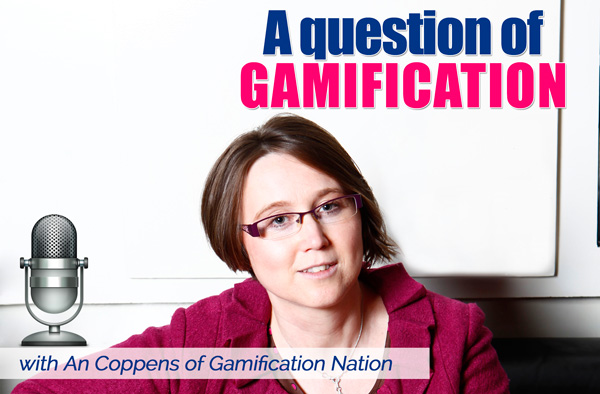Welcome to this week’s question of gamification. On this question, I get asked a lot by parents, “What are my kids learning on video games, on computer games, on mobile games?” “Should I limit their time on it,” is typically the second question. “I am worried about my kids playing too much.” It’s a very frequently asked question by managers in many organisations with children at home. They see that their children are playing and playing a lot, and I suppose with the World Health Organisation, you’re marking gaming as a disorder as well. There’s a need to explain why and what the case may be with games and what it brings or doesn’t bring to your children or young people that you know.
The first thing I will say is as a person growing up, my parents were quite protective and we were not allowed games at all in the house. So when I was growing up, I was always borrowing somebody else’s games in school in order to play. In fact, I think at one stage my dad thought that Pong was going to blow up the television. And if you don’t know Pong, look it up, it’s a very basic game with two balls knocked to the side of the screen and you have to sort of play table tennis on the TV screen. So my uncles had to uninstall it quite quickly after it had launched.
What we did do, however, is we had a lot of board games. We had a lot of card games. We were all involved in sports. Although computer things were banned, we still got to play. Actually all of my children’s parties were sets of games. Most of them I dreamt up. I was lucky to be born in June, and often then the weather in Belgium was quite nice and quite fun. We typically had really fun things in the garden, in our house.
The little puddle pool was used as the hinderness that you had to overcome or the obstacle that you had to overcome rather than the hindrance, which is nice Flemish word for that … it’s an obstacle. One group of the party people had to defend the obstacle and either make you go through it, which gave you immunity, or you had to be cunning enough to distract them and run past them super fast and get to the other side. Things like Tug of War, you name it, we did it.
For my confirmation, we had this massive life-sized board where you had to roll the dice and you move forward, and based on where you landed you had to go find the clue in the woods and perform whatever task was related to that clue. If the person that was minding that clue thought you had passed you, you were allowed to continue back to the board and the dice. Things you had to do in order to get over a clue were things like dress up and take a photo, solve a riddle. Sometimes you had to find things. There were always fun, cool stuff that happened.
So although I never actually got to own a console of any denomination of sorts, I did love to play and my parents did definitely encourage that. Even though when I asked about a career in gaming, my dad was very adamant that there was no money in games. I guess it was a good … I would have been seven, so a good couple of decades ago. Let’s just say that.
Today’s kids I think have a bit more of a privilege or access ability, I think. And maybe that’s also my worldview of a relatively well to do middle class background, because gaming, let’s not forget, this is not cheap. So a lot of kids from the lower end of the market families may still not be able to access any game consoles or just purely because of costs. And if they do, they might have to work really hard to earn access to it. So I think if your kids are gaming, you’re already in a nice place and you probably have enough money to help them do certain things. So that’s one thing.
But what are they learning? So think about it this way. If your children are playing as a team with other kids in their class, in their neighborhood, but even with other kids online that they have never met, like is the case in the large games like World of Warcraft where a whole tribe comes together, forms a team effectively, they learn how to work in a virtual team with remote coworkers following instructions. In some cases the 12 year old or the 14 year old or the 16 year old is the leader of the tribe. So they’re leading people, they’re giving instructions, they’re giving feedback. If you think about it in the workplace, essential skills, right? So if they’re engaged in that sort of play and they are really good at it I would say encourage them.
What I would also say if they do that to the detriment of having any friends in real life, then yes, pay attention to that. That’s when it is potentially an option. So anything in moderation is relatively good. But if for example, the friends online are much more important than their friends in real life, then the question needs to be raised, are they going down the line of ruling everything else out in favor of play. And that’s when you’re entering the realm of addictive behavior.
Now, most games come and go. So you’ll have children go through phases of today, Fortnite is the big thing. Fortnite has become mainstream. I saw it on the news yesterday that there’s the Fortnite world championships coming on. There’s world championships in most games. My partner plays in European championships and world championships in Othello, a board game, I used to play when I was a kid.
There’s world sports and world games for pretty much anything, and maybe not enough in management. Maybe there should be such a thing for the workplace. Maybe there should be games to prove who’s the best manager based on resources. And maybe in some way we do that because we do measure companies based on their performance. If, let’s say, the stock exchange is how management teams are rated, then you have leader boards and you have indicators of resource management because whatever money you have left, whatever money you have in the bank is at play in the world of business success.
There’s a number of things that you could draw analogies with. What else are kids learning when they’re playing games? They’re learning to solve problems. They’re learning to overcome obstacles, and they’re learning that winning is not always a guarantee. And in today’s society I think that that above all other things is an essential skill. Resilience is something all of us that have made anything with our lives have had to learn the hard way. We’ve had to probably come through some knock-backs, some setbacks in order to make it to where we are today.
I see failure. I see losing a game as feedback. Yes, not nice in the moment, but very essential for us to grow and to become a bigger and better person and to do better next time. Winning first time round and winning all of the time is for only a lucky few the way things work.
If you look at any major sports person, whether it’s a Venus Williams or a Federer, a Messi, a Hazar, whoever you interview, these guys and girls have had to train hard, they’ve had to take failure and they’ve had to be resilient in order to keep moving forward. Yes, they may have come with a talent, but unless they nurture that talent and focused in on it and became better at it with coaching, with training, with probably researching how they could get better, with analyzing how they could improve, they would never have made it to the top. And I would argue that the gamers of today, the kids that are rocking it on Twitch, the kids that are rocking it in e-sports, have actually got very similar traits. They are learning the hard way to take hits to take knocks. They practice a lot and they are also applying analysis on strategy and often have coaches to get them to play at top levels.
A few years ago I spoke at South by Southwest in Texas together with two of my fellow gamification ladies. I went to a seminar on e-sports, and about the team and how team managements are structured, how the progression is, I found it fascinating. So at age 12 that’s when you enter professional e-sports or e-sports that are going places. By Age 14 to 16 you’re at your peak. By age 18 to 21 you’re actually losing the flexibility in your muscle responses. Your responses become slower and that’s when these kids become coaches.
Now a pro-team that’s at the top of their game in e-sports, plays probably eight hours a day. The rest of the day they do exercise, very specific exercise to keep the body going but also exercise that helps them to enhance their reflexes in a game. They also have to look after nutrition, sleep, etc. So it’s not just a very one track sport. It has to be seen as the global person.
They know from research unless you are physically fit and switched on that you wouldn’t necessarily make the top level in e-sports. Which I found fascinating as well, because a lot of the thinking about parents who have this fat kid sitting up in the dark room playing video games until the night is over basically, a lot of parents have this really negative image of what gaming is and what gaming can be. And actually I think there is a lot of very good things happening as well.
Yesterday on the news they showed the first female gamer with disabilities doing well. The fact that she can play in a level playing field because of an adapted system I think is amazing. She doesn’t play in a different league. She plays in a regular league against the boys, just purely because her disability didn’t matter anymore. Her console is adapted to her playing to the best of her abilities. And she’s rocking it. And I thought, “You know what? Kudos to the gaming industry because that is also something that it provides. That is something that us in the workplace have not cracked yet.”
So I think there is a definite case for inclusion and a definite case for showing up as who you choose to be and being the best you can be in that role, that’s coming through kids in gaming. I guess I’m slightly passionate. I’m also slightly biased and you could say that.
But I suppose the things to watch out for when is it an addiction? When is it not an addiction? Well, it’s an addiction if a kid doesn’t play with their own friends anymore. It’s an addiction when actually the game becomes more important than everything else in life. Just like comparing it to alcohol or drugs or anything, if the fix becomes bigger than living, than everything else, than people, than looking after yourself, then it’s time to probably look out, “Okay, let’s tone this down. Let’s have a conversation, seek professional help and look into it.”
But the reality is for a lot of kids, the game of the month will be a different game next month or three months from now. For most kids, it’s part of growing up. It’s part of learning. It’s part of just socializing. So if you can afford it, let them engage, let them play. If you can’t afford them, let them go to the friends that have the games and they can play and see what you can do. I think games today are becoming more economically viable for most of us, so it doesn’t need to be exclusive. Even though e-sports may still be for the privileged few, just like elite sports on any level in any game is probably much more for the elite few than for the masses.
But games, they have rules. Kids learn to behave according to rules. Strategy games and multiplayer games encourage them to learn about teams, sometimes even teach them to manage teams. In all games there’s communication. In all games there is learning from losing, learning from winning, thinking of, “Okay, how can I do better next time.” And focused attention for long periods of time is what we say young kids don’t have anymore until they sit down at a computer game. They show that they actually do have it. So pushing them in other areas in work to engage in really good engaged work is also parts of the realms of possibility. A good book can do the same, a good movie can do the same.
Kids haven’t lost that ability. We just have lost the ability to encourage them to do it. And maybe that’s our fault as adults to not engage at the right level with the right bits of feedback. The one thing that games do do is give instant feedback. Learn in the moment. So learning is becoming much more rapid in a game, then for example, three or four months down the line or weeks down the line, you get feedback on the work you did two weeks ago. So there is something to be said for that.
Being a manager myself, it’s not always easy when you’re juggling many tasks on your to-do list, but also many tasks for your team and many priorities for your business, for your work, etc. And as a parent that’s no difference. So where can you use games and gamification to make their lives better is what I would say. But then I have a vested interest in that.
What can your children learn from games a lot? So let them play. Play with them, because for some kids that’s the only interaction they have with you. If you’re attached to your smart device, attach to their smart device. Learn their game, or at least engage in a game that you have in common, because they may not appreciate if you’re totally bad at Fortnite, don’t go playing Fortnite with them because they’ll only laugh at you and consider you a nuisance. But there may be other games.
We always had board games in our family and we still do. There’s nothing wrong with that. I used to always be delighted if we could play a little game and weren’t told to go play by ourselves. So engage, engage at their level and find the common game that’s yours and that makes it family time so that you can engage.
So yeah, will people learn? Yes, absolutely. Do Kids today need games? Totally. Just like we did. We’re no different in the end of the day. Motivations have actually not drastically changed over time. We all still want to be loved, respected, and appreciated for the talents that we bring, and encouraged when those talents don’t reach far enough or we got it wrong. We need second chances.
Either way I would say don’t lose sight of the bigger picture. What did you learn when you were young? What did you play with when you were young? And yeah, if the symptoms are not drastic and not in any way negative than just let them play. Let them learn. Ask them on a regular basis, what are they learning? Who are they playing with? What are they playing? What’s the best game on the market today? And look it up. There’s always kids doing live streams of the games they play. So that you understand what they’re dealing with. So that you understand how the game works and what potentially they could learn from this game. I would say, yeah, let it be, let them play and play with them. Join them. If you can’t win, join them.
I hope you enjoyed this week’s question of gamification, and I hope to have you back on the podcast very soon and talk to you in a couple of days. I love it if you would give us some positive feedback. So if you like our podcast, absolutely give us a good rating. If you don’t like it, let me know. I’d prefer if you let me know personally as opposed to publicly. And also if you have a question that you would like us to answer, by all means send it my way. Thank you for listening.




